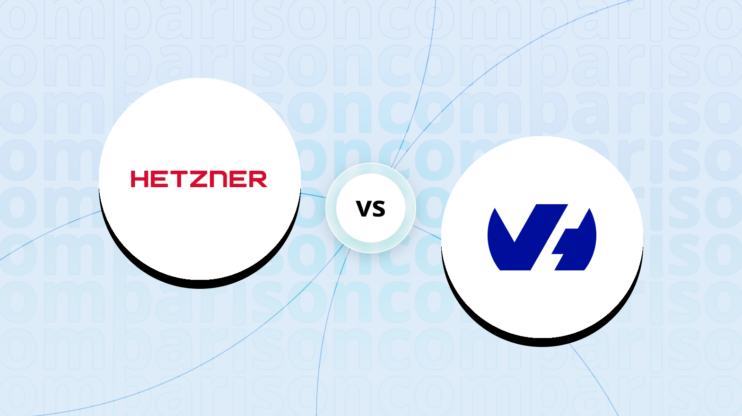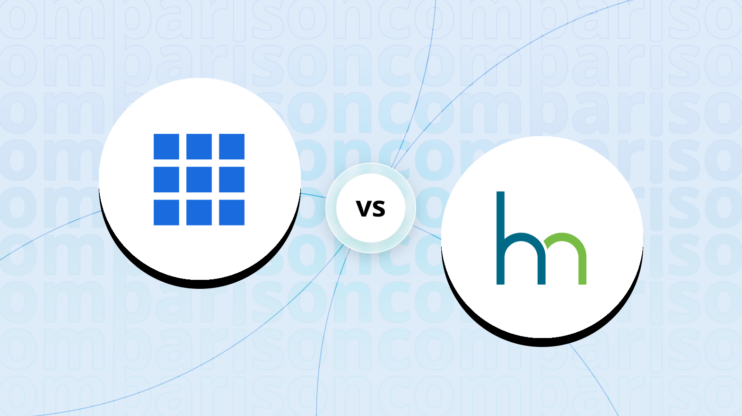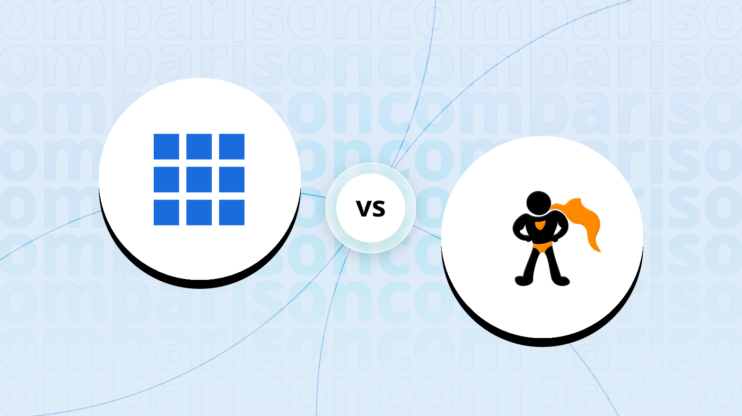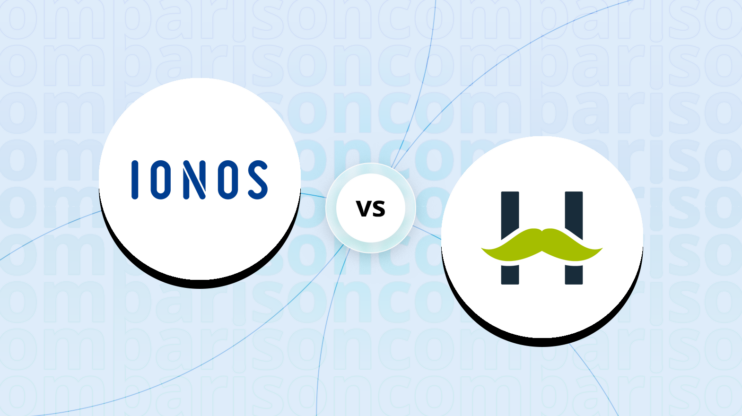Dreamhost vs Web Hosting Hub: Final verdict
Looking over Example hosting one vs. Example hosting two, it’s clear why both hosts are so popular. They have both hosted millions of
websites that run on WordPress for decades, building up a loyal customer base.
-
Web Hosting Hub (Overall grade: 7.5)
shines with its speed, uptime, and user-friendliness. It offers competitive pricing with free SSDs, unlimited bandwidth, and additional perks such as a free domain and website transfer. The BoldGrid website builder adds a straightforward drag-and-drop functionality, making it ideal for beginners. However, the inclusion of extra costs for features like backups and the higher starting prices for plans may be a deterrent for some users looking for more budget-friendly options. -
DreamHost (Overall grade: 8.2)
stands out for its impressive uptime guarantee, high-performance cloud technology, and more extensive array of hosting plans, including VPS and dedicated hosting. It offers built-in caching, automated backups, and strong security features like multi-factor authentication. DreamHost’s custom-built control panel and proprietary tools provide a user-friendly experience. Even though it lacks direct phone support, its comprehensive knowledge base and reliable 24/7 chat and email support ensure user satisfaction.
 Overall grade:8.2 |
 Overall grade:7.5 |
|
|---|---|---|
| Uptime and Availability | 8.5 | 9.2 |
| Hosting Performance | 7.8 | 5.0 |
| Hosting Security | 7.8 | 8.0 |
| Price | 8.2 | 7.6 |
| Hosting Features | 7.9 | 6.9 |
| Ease Of Setup | 8.9 | 8.8 |
| User Management | 8.1 | 7.1 |
| Customer Support | 8.3 | 7.8 |
| User feedback | 4/5 | 4.5/5 |
Hosting types offered
Both platforms provide a variety of hosting types, each designed to meet the different needs of users.
 |
 |
|
|---|---|---|
| Shared hosting | ||
| Cloud hosting | ||
| WordPress hosting | ||
| Ecommerce hosting | ||
| VPS hosting | ||
| Dedicated hosting |
Although both offer a variety of hosting plans tailored to different needs, in certain cases, one platform may prove to be more suitable.
Detailed comparison
Uptime and availability
Evaluates the average uptime statistics, uptime guarantee and overall availability of the hosting
provider
Score Components:
- Uptime percentage (30%): evaluates the uptime statistics in given period of time
- Uptime guarantee (20%): Assesses if the platform offers an uptime guarantee and
whether the actual uptime matches the promised guarantee. - General performance (25%): Evaluates how fast is the average response time and overall
it’s stability. - Responsiveness (10%): Adaptability to different devices and screen sizes.
- Availability (25%): Reflects the total downtime and number of outages.
 8.5
8.5
 9.2
9.2
Winner Web Hosting Hub: Leading in speed and uptime with a variety of performance plans.

DreamHost stands out with its exceptional uptime guarantee and consistent performance. With a perfect 100% uptime in many tests, users can trust its reliability. DreamHost also offers fast server speeds and a proprietary control panel, making it user-friendly. Compensation for downtime adds to its appeal, ensuring customers get their money’s worth.

Web Hosting Hub excels in both speed and uptime, making it a preferred choice for many. Offering competitive pricing, free SSDs, and unlimited bandwidth, it caters to various performance needs with its Spark, Nitro, and Dynamo plans. Additional perks include a free domain, free website transfer, and 24/7 support, making it a comprehensive hosting solution.
Which one has better hosting performance?
Score Components:
- Hosting speed (30%): This includes SSD quality, Load times, PageSpeed score ranges,
additional information on website speed, built-in plugins for performance enhancement, available caching
methods, and CPU/RAM options - CDN (20%): Considers whether CDN is available or not, whether it’s free or paid, and
the quality of the CDN service - Available data centers (30%): Evaluates the number of data centers and their locations
globally. - Scalibility (20%): Looks at whether elastic scaling is available, the process required
to scale (manual upgrade vs. automatic scaling), the presence of dedicated servers, and the costs
associated with scaling.
 7.8
7.8
 5.0
5.0
🏆 Winner
DreamHost: Streamlined, high-performance hosting with flexible scalability and advanced security features.
When it comes to general performance, DreamHost stands out. It leverages high-performance cloud technology with NGINX hosting, server-level caching, and SSD storage, ensuring fast load times and secure file transfers. DreamHost’s performance tools, such as automated software updates and OPcache, further enhance website speed. In contrast, Web Hosting Hub offers standard SSD speed and additional memory depending on the plan but lacks the advanced caching and specific resource dedication that DreamHost provides. Both services provide free SSL certificates, but DreamHost goes further with multi-factor authentication and daily automated backups. Moreover, DreamHost has multiple data centers enhancing reliability, crucial for maintaining uptime.
Website Speed
DreamHost’s integration of high-performance cloud technology and server-level caching results in faster website loading times. The SSD storage used provides substantial speed improvements, making DreamHost a better option for users who need consistent speed and performance. Additionally, NGINX hosting ensures the site can handle a large number of concurrent connections efficiently. Web Hosting Hub, while offering 2X and 4X performance on higher-tier plans, does not match the speed enhancements provided by DreamHost’s caching and cloud technology.
Scalability
DreamHost offers expandable RAM and storage, making it easy to scale your website as it grows without needing to change plans frequently. Dedicated servers are available, with options that scale up to meet the demands of larger websites or applications. Web Hosting Hub lacks detailed information on elastic scaling but offers different plans with increasing resources. While Web Hosting Hub has value-for-money plans, DreamHost provides a more flexible and feature-rich scaling experience with uncapped bandwidth, automatically adapting as your needs grow.
Which one has better security features?
and regulatory requirements
Score Components:
- Technical security measures (40%): This includes encryption, firewalls, DDoS
protection, secure configurations, server monitoring, access control and availability of security addons
(e.g Sitelock security). - Operational security measures (30%): Encompasses data privacy, backups and data
redundancy. - Compliance and certifications (20%): Adherence to legal and regulatory requirements
(e.g., GDPR, HIPAA) and possession of certifications (e.g., ISO 27001, SOC 2). - Business and reliability (10%): Factors in the provider’s reputation, uptime
guarantees, and customer support.
 7.8
7.8
 8.0
8.0
🏆 Winner Web Hosting Hub: A hosting provider with strong security features and comprehensive support for various security measures.
Both DreamHost and Web Hosting Hub have notable differences in their approaches to technical and operational security, as well as in their compliance with regulations.
Technical security measures:
DreamHost offers free SSL certificates through Let’s Encrypt, while Web Hosting Hub provides a simple-to-enable private SSL for free. Both hosts support third-party SSLs, but DreamHost does not support wildcard certificates, requiring unique certificates for each domain. DreamHost supports current PHP versions, including PHP 8, with OPcache enabled for better performance. Web Hosting Hub supports PHP 7, which is known for enhanced performance and security features. Both hosts offer SSH access for secure remote management, but DreamHost adds additional layers like DDoS protection and RAID 1 storage for reliability.
Operational security measures:
DreamHost includes multi-factor authentication (MFA) and optional malware scanning through DreamShield. They also offer features like mod_security and password-protected directories. Web Hosting Hub offers advanced policy firewall protection, suPHP encryption, and IP blocking. Additionally, Web Hosting Hub provides automatic backups, which DreamHost does not specify. Both services offer 24/7/365 support, with DreamHost delivering expert support and Web Hosting Hub providing U.S.-based support via live chat and phone.
Compliance and certifications:
DreamHost is explicitly GDPR compliant and also offers a Privacy Center for user data management. They are PCI compliant for their own sites but not for customer websites. DreamHost does not support HIPAA compliance for protecting medical records. Web Hosting Hub emphasizes data security and privacy but does not explicitly mention GDPR or PCI compliance. The lack of HIPAA compliance for Web Hosting Hub is similarly not specified.
 |
 |
|
|---|---|---|
SSL certificate |
Yes |
Yes |
Additional security features |
DreamShield, MFA, mod_security |
Firewall, suPHP, IP Blocking |
PHP versions |
PHP 8 |
PHP 7 |
GDPR compliance |
Yes |
Not specified |
HIPAA compliance |
No |
Not specified |
PCI compliance |
Only for own sites |
Not specified |
Hosting features
Score Components:
- Domains (20%): Assesses the availability of a free domain, domain purchase options, and
pricing - Email (15%): Considers if the provider offers full email hosting, or is reselling
third-party service, and if the email is only transactional or not - Website builder (15%): Checks if website builder is available, and it’s user
friendliness and overall the level of customization allowed. - Staging environment (20%): Determines if a staging environment is available, allowing
for testing changes before going live. - FTP & SFTP accounts (10%): Evaluates if and how easily users can access FTP and
SFTP accounts - Git and SSH access (20%): Assess whether Git is integrated into the hosting service and
if SSH access is provided
 7.9
7.9
 6.9
6.9
🏆 Winner DreamHost: An impressive blend of affordability, comprehensive features, and dedicated support.
DreamHost and Web Hosting Hub both stand out as strong hosting providers, each with unique strengths. DreamHost offers an array of hosting plans, ranging from shared hosting to dedicated servers, making it flexible for various needs. It boasts powerful hosting environments, including instant WordPress setup and an optimized server infrastructure featuring solid-state storage. Noteworthy perks from DreamHost include a free domain, WHOIS privacy protection, and automated backups, alongside a free migration service for higher-tier plans. Its custom-built control panel ensures ease of management, and the provider maintains a commendable 100% uptime guarantee, ensuring reliability for users.
Web Hosting Hub, on the other hand, emphasizes ease of use with features like the BoldGrid website builder, offering drag-and-drop functionality perfect for beginners. The provider incorporates SSD storage as standard, ensuring speed and performance. Free domain registration and transfers, along with unlimited storage, bandwidth, emails, and MySQL/PostgreSQL databases across its plans, cater to a wide range of users. The option to select data center locations for enhanced speed and a robust support system available 24/7 make Web Hosting Hub a solid choice. However, the inclusion of additional costs for features like backups and the relatively higher starting prices for plans may influence the final decision of some users.
 |
 |
|
|---|---|---|
| Free domain | Yes | Yes |
| Free SSL | Yes | Yes |
| Email hosting | Yes | Yes |
| Website builder | No | Yes, BoldGrid |
| Staging environment | Yes | No |
| FTP & SFTP accounts | Yes | Yes |
| Git and SSH access | Yes | Yes |
| Free backup | Yes, selective plans | No |
| Money back guarantee | Yes, 97 days | Yes, 90 days |
Email services at DreamHost are provided through a partnership with Microsoft 365, offering a professional email and access to Outlook on a trial basis before transitioning to a paid service. Conversely, Web Hosting Hub provides unlimited free professional email accounts, which is particularly beneficial for users requiring multiple email accounts without incurring additional costs.
Price
Score Components:
- Plan value (40%): What each pricing tier offers.
- Transparency and clarity (30%): Clearness of pricing structures.
- Flexibility of plans (20%): Range of options to suit different budgets.
- Hidden costs (10%): Additional expenses not included in the plan.
 8.2
8.2
 7.6
7.6
🏆 Winner DreamHost: Offers extensive plan options with competitive features.
Evaluating the pricing of plans among various hosting providers can be complex due to their differing pricing and renewal strategies. Additionally, certain plans require annual commitments, which adds to the difficulty of making comparisons. The prices listed are based on monthly commitments; plans requiring annual commitments are indicated. Additionally, although some providers offer identical plans for WordPress and shared hosting, we have created separate tables for each to enhance clarity.
When comparing the pricing plans of DreamHost and Web Hosting Hub, DreamHost presents a broad range of plans catering to diverse needs—shared hosting starting at $2.59/month, VPS plans at $10/month, and specialized WordPress hosting at $16.95/month. Web Hosting Hub focuses on three primary plans—Spark ($11.99/month), Nitro ($15.49/month), and Dynamo ($20.49/month). DreamHost provides features like unlimited storage and automated daily backups across all plans. While Web Hosting Hub offers additional perks such as free advertising credits and a longer refund period of 90 days, DreamHost maintains flexibility with varied hosting types, priority support in higher-tier plans, and enhanced security features. These attributes make DreamHost a versatile choice for different user needs.

|

|
|---|---|
|
DreamPress$19.99/mo
1 website, 30GB SSD storage, unmetered bandwidth, 24/7 support, free domain, built-in caching, automated & on-demand backups.
Value for price:8.5/10
|
N/A
Value for price:N/A
|
|
DreamPress Plus$34.99/mo
1 website, 60GB SSD storage, unmetered bandwidth, 24/7 support, free domain, built-in caching, automated & on-demand backups, priority support.
Value for price:8.0/10
|
N/A
Value for price:N/A
|
|
DreamPress Pro$89.99/mo
1 website, 120GB SSD storage, unmetered bandwidth, 24/7 support, free domain, built-in caching, automated & on-demand backups, priority support.
Value for price:7.5/10
|
N/A
Value for price:N/A
|

|

|
|---|---|
|
Shared Starter$5.99/mo
1 website, unlimited storage, unlimited bandwidth, 24/7 support, free domain, free SSL, automated backups.
Value for price:8.0/10
|
Spark$11.99/mo
2 websites, unlimited storage, unlimited bandwidth, 24/7 support, free domain, free SSL, free advertising credits.
Value for price:7.5/10
|
|
Shared Unlimited$10.99/mo
Unlimited websites, unlimited storage, unlimited bandwidth, 24/7 support, free domain, free SSL, automated backups, email hosting.
Value for price:8.5/10
|
Nitro$15.49/mo
Unlimited websites, unlimited storage, unlimited bandwidth, 24/7 support, free domain, free SSL, free advertising credits.
Value for price:7.8/10
|
|
N/A
Value for price:N/A
|
Dynamo$20.49/mo
Unlimited websites, unlimited storage, unlimited bandwidth, 24/7 support, free domain, free SSL, free advertising credits.
Value for price:8.0/10
|

|

|
|---|---|
|
DreamCompute$10.00/mo
Scalable cloud computing, SSD storage, blazing-fast networking, root access, open APIs, 24/7 support.
Value for price:8.0/10
|
N/A
Value for price:N/A
|
|
DreamObjectsVaries by Usage
Cost-effective cloud storage, unlimited subdomains, compatible with Amazon S3 API, 24/7 support.
Value for price:N/A
|
N/A
Value for price:N/A
|
Enterprise plans
DreamHost provides dedicated hosting options such as Standard 16 ($199/month) with 16GB RAM and 480GB SSD storage. In contrast, Web Hosting Hub does not have enterprise-specific plans but offers the Dynamo plan as its top-tier option with features suitable for high-demand websites. DreamHost’s dedicated plans emphasize high-performance hardware, unlimited bandwidth, and enhanced support, tailored for large-scale businesses requiring guaranteed uptime and significant resources.
Dreamhost vs Web Hosting Hub: Ease of setup
platform.
Score Components:
- Site migration (25%): Assesses whether the provider offers tools for site migration,
either automated or manual, and whether these services are free or require a fee. - Admin panel usability (35%): Evaluates the type of admin panel provided, such as the
standard cPanel or a custom solution, focusing on its accessibility and user-friendliness for both
technical and non-technical users. - Setup features (20%): Examines the availability and ease of use of various setup
features, including FTP accounts, file managers, email account setup, PHPMyAdmin, and easy CDN
configuration. - Help center quality (20%): Measures the quality and accessibility of the provider’s
help center resources, including articles and tutorials.
 8.9
8.9
 8.8
8.8
🏆 Winner DreamHost: DreamHost offers a highly accessible hosting experience with an emphasis on customer support and easy migration.
DreamHost provides a custom-built control panel designed for ease of use, featuring advanced tools like SFTP and WP-CLI. This panel is particularly intuitive for both beginners and experienced users, making tasks such as domain management and backup configurations straightforward. Web Hosting Hub, on the other hand, utilizes the industry-standard cPanel, which is favored for its familiarity and comprehensive functionality. cPanel is accessible and well-documented, offering a range of options that cater to both technical and non-technical users. Both hosting providers excel in their administration panel offerings, but DreamHost’s unique panel provides a more tailored experience.
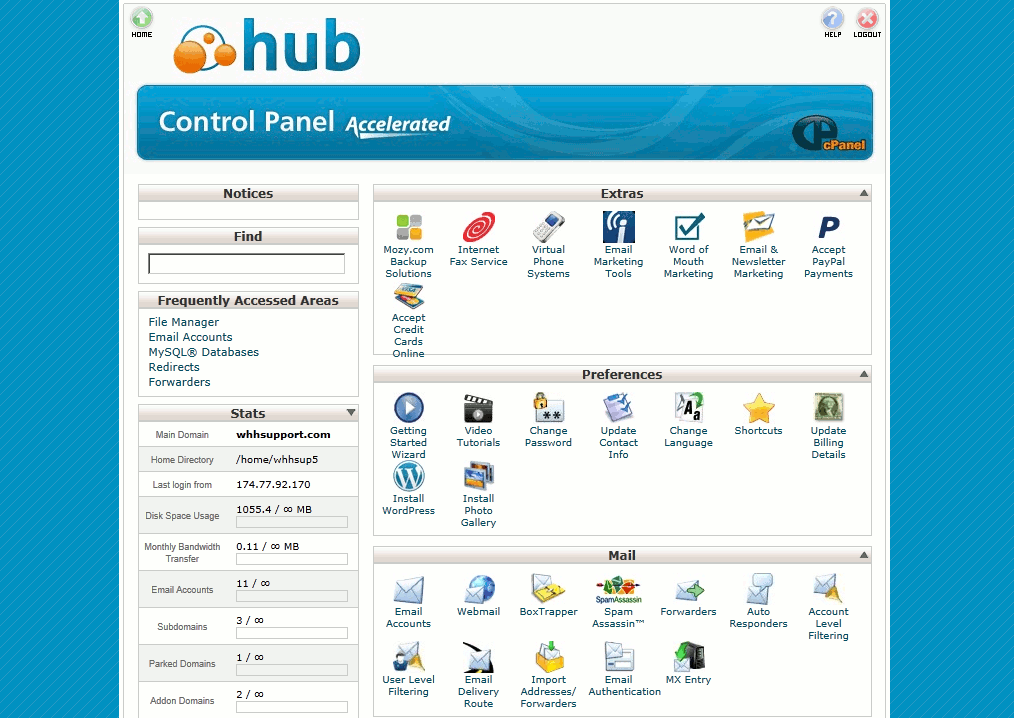
When it comes to migration tools, DreamHost takes the lead with its Migration Dashboard. This feature automatically scans your site and presents migration options, guiding users through the process seamlessly and at no extra cost. Web Hosting Hub also offers migration assistance, facilitated through their support services, although it requires manual steps and may not be as comprehensive. Both providers allow free domain transfers, but DreamHost’s automated tools provide a smoother experience.
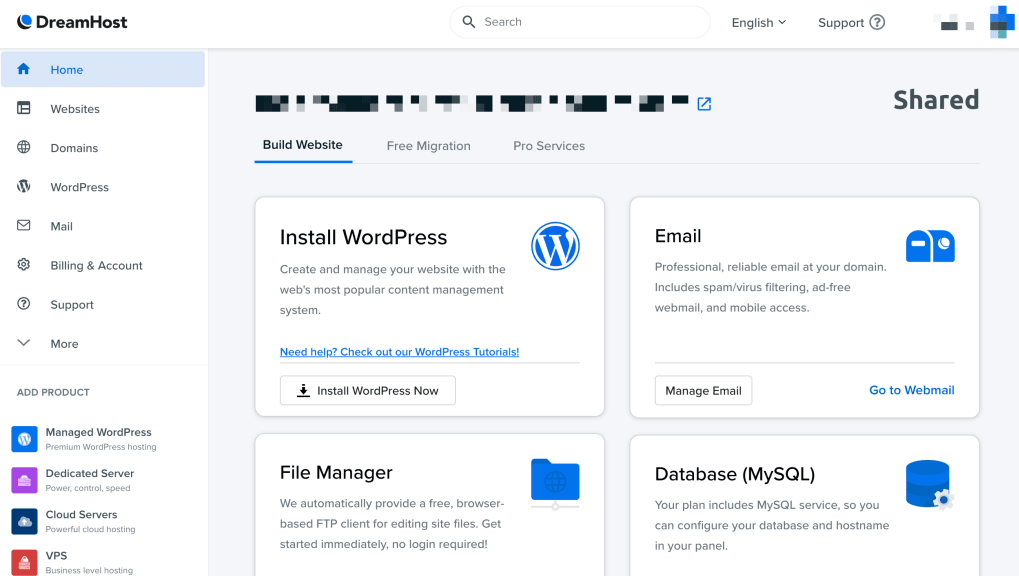
DreamHost excels in the quality and accessibility of its help center resources. Their extensive knowledge base and 24/7 support via chat and email ensure users receive quick and reliable assistance. Additionally, DreamHost’s guides and resources are continually updated and include contributions from WordPress experts. Web Hosting Hub also provides valuable resources, such as tutorials, community Q&A, and various tools, complemented by 24/7 support through live chat and phone. While both have strong support systems, DreamHost’s extensive and actively updated knowledge base gives it a slight edge.
The platforms provide extensive knowledge bases filled with guides, how-to articles, and instructional content. DreamHost offers a wide range of resources alongside 24/7 chat and phone support. Web Hosting Hub also boasts a detailed help center with an intuitive search function and around-the-clock support via live chat, phone, and ticketing, ensuring comprehensive user support.
User management
accessibility.
Score Components:
- Role customization (40%): Flexibility in creating and defining user roles and
permissions. - Ease of management (30%): User interface and tools for managing users.
- Access control (20%): Effectiveness of access control measures for different user
levels. - Scalability (10%): Ability to manage a growing number of users efficiently.
 8.1
8.1
 7.1
7.1
🏆 Winner DreamHost: DreamHost offers extensive and user-friendly solutions for managing user roles and permissions.
When it comes to managing user roles, permissions, and accessibility, DreamHost allows the creation of unlimited SFTP users and provides SSH access for secure command-line operations. It also offers Crontab access and an SVN repository, giving advanced users flexibility in managing tasks and source code. By contrast, Web Hosting Hub lets you create FTP accounts with specific levels of access and manage database users through phpMyAdmin. Both platforms offer password protection for directories and various methods to block or filter access. However, DreamHost stands out with its more granular control options and advanced features.
DreamHost features a custom-built control panel designed for intuitive use, allowing seamless management of domains, emails, FTP & SSH, and more. The ability to manage these aspects from a unified interface simplifies the administration process. Web Hosting Hub uses the widely recognized cPanel, offering a robust suite of tools for managing email accounts, FTP, and databases. Both interfaces are user-friendly, but DreamHost’s control panel is particularly noted for its ease of use and efficiency.
Access control measures on both platforms are efficient, but DreamHost enhances this with advanced options like access to raw log files and automated tasks through Crontab. DreamHost also includes password protection and secure remote access, accommodating growing user needs effectively. Web Hosting Hub offers secure access but lacks the same level of granularity in user management. While it supports SSH and IP blocking, DreamHost’s broader range of controls makes it more adaptable for expanding user bases and varied user roles.
DreamHost user roles table:
| Role | Description | Access highlights |
|---|---|---|
| SFTP User | Securely access files via SFTP | Full access to specific directories assigned by the admin |
| Crontab User | Automate command-line tasks | Access to schedule and manage cron jobs |
| SVN User | Collaborate on web apps or websites using Subversion repository | Access to source code and version control |
| Regular User | Perform standard activities including email and file management | Limited to specific email accounts and file directories |
Customer support
hosting provider.
Score Components:
- Support communication channels (30%): Measures the variety of customer support types
provided (live chat, chatbot, email, phone, etc.) - Availability (20%): Assesses the availability hours for each channel, including 24/7
support options. - Technical support quality (30%): Assesses whether the provider offers comprehensive
technical support, including hardware upgrades (e.g., HDD to SSD), software installations, and web
server configuration changes. - Enterprise support (20%): Checks if there are dedicated or priority support services
for enterprise-level customers.
 8.3
8.3
 7.8
7.8
🏆 Winner DreamHost: DreamHost offers comprehensive, round-the-clock support channels and a longer money-back period.
 |
 |
|
|---|---|---|
Phone support |
||
Live chat support |
||
Chatbot |
||
Email/ticket support |
||
Enterprise support (dedicated agent, priority support) |
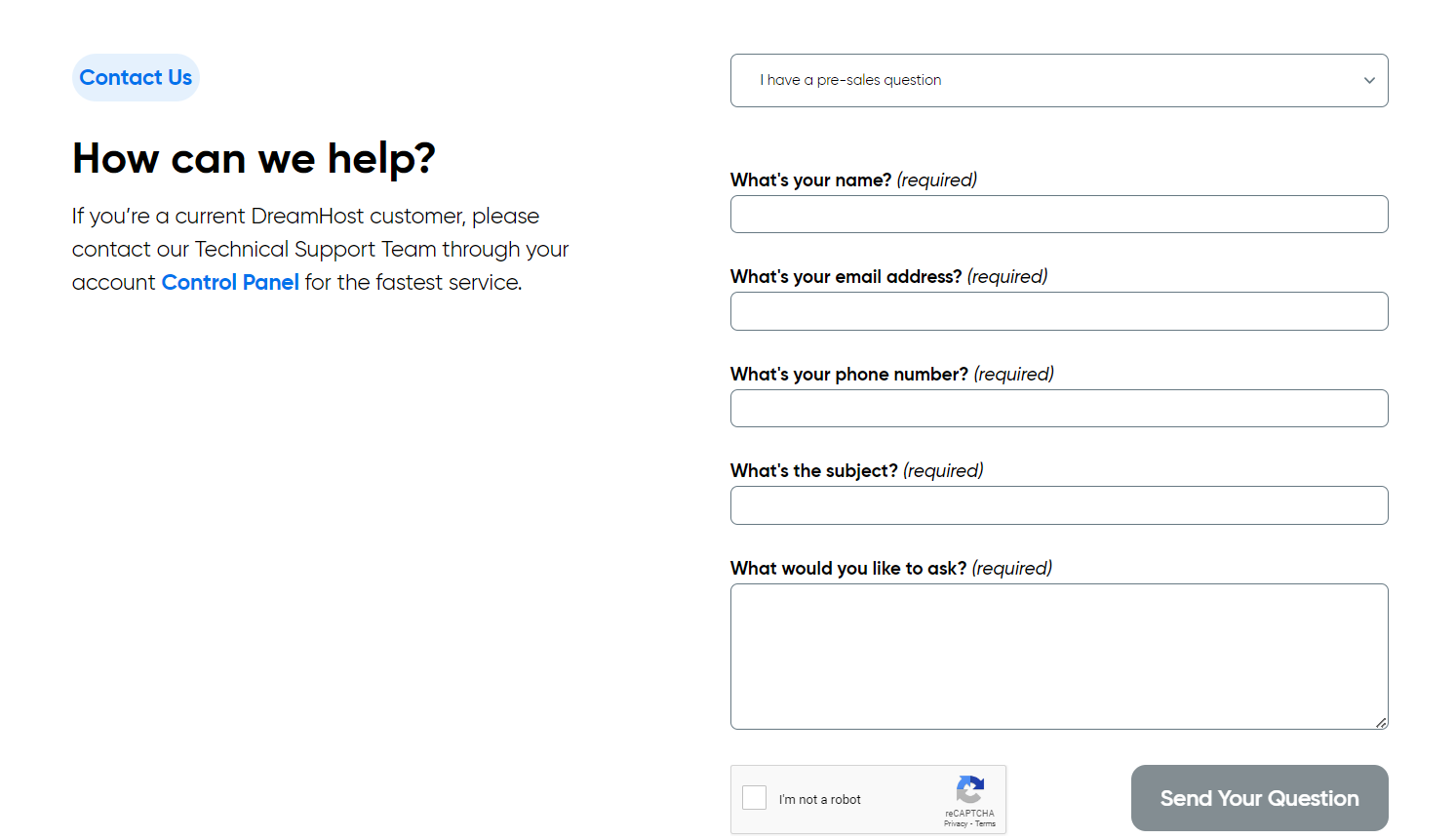
DreamHost provides support through various channels, including live chat, email/ticket, and a callback service for an extra fee. DreamHost’s support is available in both English and Spanish, ensuring a broad customer base is covered. They lack direct phone support but do offer a comprehensive knowledge base and professional services for web design, marketing, and web development. DreamHost’s response time for live chat is usually within minutes, with tickets typically answered within an hour or two.

Web Hosting Hub, on the other hand, has a strong focus on telephone support, available 24/7 for general support and at specific times for sales and billing. They also offer support via email, chat, and a help desk. Notably, Web Hosting Hub includes Skype as a contact method for various departments, fostering easier communication for some users. Their 90-day full money-back guarantee is slightly shorter than DreamHost’s, but still provides substantial customer reassurance. Despite these features, they do not offer enterprise support with a dedicated agent or priority support.
Dreamhost vs Web Hosting Hub: User feedback
DreamHost receives praise for its proactive updates, reliable performance, and a range of hosting options at competitive prices. Users appreciate its intuitive web portal, comprehensive end-to-end domain management tools, and competent customer service, particularly in resolving issues. However, the platform’s technical support is often criticized for slow responses, particularly the lack of phone support, and occasional downtime issues. Despite these drawbacks, many users remain loyal due to the affordability, ease of use for beginners, and strong uptime guarantees, although some have experienced more significant challenges and dissatisfaction.
Overall, users appreciate the ease of use, affordability, and extensive features offered by this hosting provider. Many reviews praise the customer support for being responsive and knowledgeable, contributing to a generally positive experience. However, some users have noted the interface can be complex and occasionally overwhelming, and there are mixed feelings about the pricing for additional services like SSL. Despite minor inconveniences such as periodic connectivity issues and maintenance times, the hosting provider is highly recommended for its value and efficient support.
Dreamhost vs Web Hosting Hub: FAQ
Which platform is better suited for hosting WordPress websites?
DreamHost is better suited for hosting WordPress websites, providing optimized WordPress hosting with cloud performance, security, automatic updates, and priority support. Web Hosting Hub offers WordPress hosting as well, but it lacks the cloud performance and extensive support features that make DreamHost stand out in this category.
Which hosting service offers better security features?
DreamHost offers better security features, including multi-factor authentication, free SSL certificates, automated backups, and strong protections like DDoS protection and RAID 1 storage. While Web Hosting Hub also provides solid security measures such as firewalls, suPHP encryption, and IP blocking, it does not match the comprehensive security suite offered by DreamHost.
What are the major differences in pricing and value between DreamHost and Web Hosting Hub?
DreamHost presents a broader range of plans catering to diverse needs, with prices starting as low as $2.59/month for shared hosting. Web Hosting Hub focuses on three primary plans starting at $11.99/month. DreamHost’s plans include features like unlimited storage and automated backups, providing greater value, while Web Hosting Hub offers additional perks such as free advertising credits and a 90-day refund period, but higher starting prices may deter budget-conscious users.
Which hosting service offers more scalability options for growing websites?
DreamHost offers more scalability options, providing expandable RAM and storage, VPS and dedicated hosting options, and various tools to handle high-traffic and resource-intensive websites. Web Hosting Hub, while offering different plans with increasing resources, does not provide the same level of flexibility and resource dedication as DreamHost.
What are the differences in the control panels offered by each hosting service?
DreamHost features a custom-built control panel designed for ease of use, allowing seamless management of domains, emails, FTP & SSH, and more from a unified interface. Web Hosting Hub uses the industry-standard cPanel, known for its familiarity and comprehensive functionality. Both interfaces cater to different user preferences, but DreamHost’s custom panel provides a more tailored and streamlined experience.
The making of this blog
We followed a clear, step-by-step process to write and research this article.









